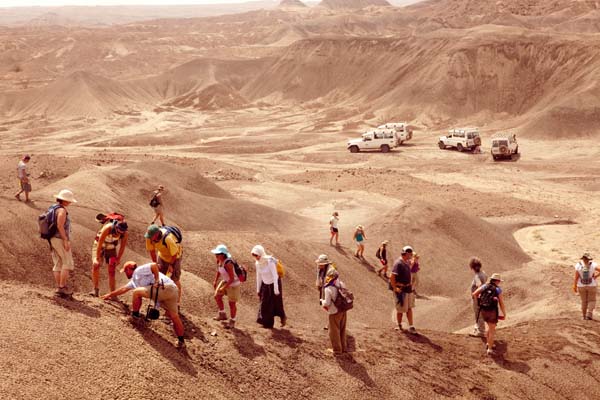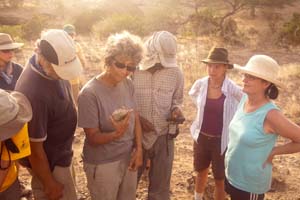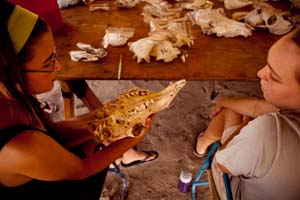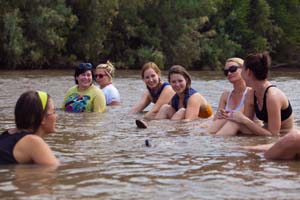Field
School Faculty
Bill
Kimbel
is Virginia M. Ullman Professor of Natural History and the Environment
in the School of Human Evolution and Social Change, and Director
of the Institute of Human Origins, Arizona State 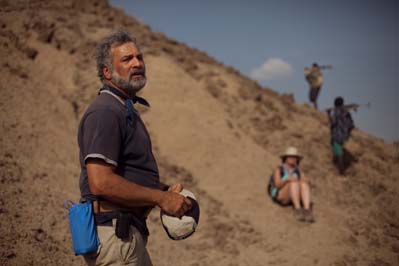 University. He conducts field, laboratory, and theoretical research
in paleoanthropology, with primary foci on Plio-Pleistocene hominid
evolution in Africa and the late Pleistocene of the Middle East. He
has co-directed paleoanthropological research since 1990 at the Hadar
Hominin Site, and has collaborated with Israeli colleagues on the excavation
of Middle Paleolithic cave deposits in northern Israel. His lab-oriented
interests are in the evolution of hominid skull morphology and function,
variation and systematics, and the concept of the species as applied
to paleoanthropological problems. [Ph.D. Kent State University, 1986].
University. He conducts field, laboratory, and theoretical research
in paleoanthropology, with primary foci on Plio-Pleistocene hominid
evolution in Africa and the late Pleistocene of the Middle East. He
has co-directed paleoanthropological research since 1990 at the Hadar
Hominin Site, and has collaborated with Israeli colleagues on the excavation
of Middle Paleolithic cave deposits in northern Israel. His lab-oriented
interests are in the evolution of hominid skull morphology and function,
variation and systematics, and the concept of the species as applied
to paleoanthropological problems. [Ph.D. Kent State University, 1986].
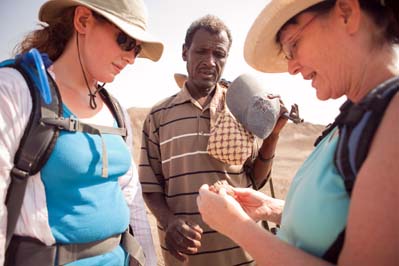 Kaye
Reed is Associate Professor, School of Human Evolution and Social
Change, and Research Scientist at the Institute of Human Origins, Arizona
State University. She has research interests in ecology, paleoecology,
human evolution, fossil mammalian faunas, community ecology, and viewing
all animals in their natural habitat. Specific to the Hadar Hominin
Locality, she is interested in landscape ecology: the spatial patterning
of mammals and other animals across various types of depositional environments.
She is also currently collaborating with archaeologists on Neandertal
and modern human localities in Spain, Morocco, and South Africa. Field work experience
includes localities in South Africa, Ethiopia, Morocco, Spain, Eritrea, Argentina,
and Montana. From 1998 until 2003 she co-directed the Paleoanthropology
Field School at Makapansgat, South Africa. [Ph.D. State University of
New York at Stony Brook, 1996]
Kaye
Reed is Associate Professor, School of Human Evolution and Social
Change, and Research Scientist at the Institute of Human Origins, Arizona
State University. She has research interests in ecology, paleoecology,
human evolution, fossil mammalian faunas, community ecology, and viewing
all animals in their natural habitat. Specific to the Hadar Hominin
Locality, she is interested in landscape ecology: the spatial patterning
of mammals and other animals across various types of depositional environments.
She is also currently collaborating with archaeologists on Neandertal
and modern human localities in Spain, Morocco, and South Africa. Field work experience
includes localities in South Africa, Ethiopia, Morocco, Spain, Eritrea, Argentina,
and Montana. From 1998 until 2003 she co-directed the Paleoanthropology
Field School at Makapansgat, South Africa. [Ph.D. State University of
New York at Stony Brook, 1996]
Christopher
Campisano is Assistant Professor, School of Human Evolution and Social Change, and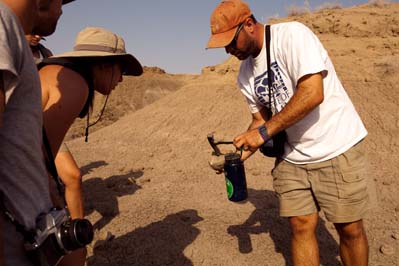 Research Scientist at the Institute of Humkan Origins, Arizona State University.
His research interests revolve around the broad issue of the environmental
context of hominid evolution. Specifically, he is interested in characterizing
ancient landscapes and their change across both space and time at varying
degrees of resolution by integrating paleontological assemblages and
depositional environments. In combination with work on geochronology
and tephrostratigraphy, this information provides a temporal-spatial
environmental framework in which to test theories of hominid evolution.
His current research builds upon the existing geological, paleontological
and environmental interpretations of the Plio-Pleistocene Hadar Formation
in Ethiopia to provide a more comprehensive synthesis of its geology
and of the hominin habitats that existed there. This research tends
to be more problem-oriented than discipline-bounded and requires a broad-based
approach and cooperation with specialists from around the world. He
has participated in more then ten field projects at a half dozen hominid
localities in Ethiopia, South Africa, and Kenya. [Ph.D. Rutgers University,
2007]
Research Scientist at the Institute of Humkan Origins, Arizona State University.
His research interests revolve around the broad issue of the environmental
context of hominid evolution. Specifically, he is interested in characterizing
ancient landscapes and their change across both space and time at varying
degrees of resolution by integrating paleontological assemblages and
depositional environments. In combination with work on geochronology
and tephrostratigraphy, this information provides a temporal-spatial
environmental framework in which to test theories of hominid evolution.
His current research builds upon the existing geological, paleontological
and environmental interpretations of the Plio-Pleistocene Hadar Formation
in Ethiopia to provide a more comprehensive synthesis of its geology
and of the hominin habitats that existed there. This research tends
to be more problem-oriented than discipline-bounded and requires a broad-based
approach and cooperation with specialists from around the world. He
has participated in more then ten field projects at a half dozen hominid
localities in Ethiopia, South Africa, and Kenya. [Ph.D. Rutgers University,
2007]
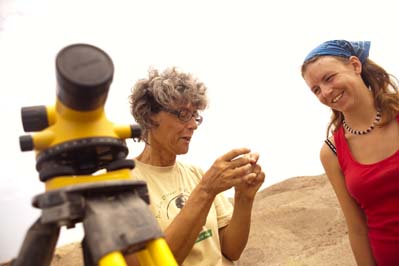 Erella Hovers is a professor at The Institute of Archaeology, The Hebrew University of Jerusalem. Her research interests include the Plio-Pleistocene archaeology of East Africa, the Middle Paleolithic of the Levant, evolution of symbolism and art, lLithic technology, subsistence and mobility (land-use strategies) of early hominins, taphonomy and site formation processes, and archaeological theory. Her ongoing projects include: The Neandertal site of Amud Cave, Israel : excavations (1991-1994) and publication of interdisciplinary research results (with Y. Rak, W. Kimbel, R. Rabinovich, P. Goldberg, Y. Goren, M. Madella and others); Late Pliocene archaeology in Hadar, Northern Ethiopia: excavations (1994, 2000-2002) and publication of interdisciplinary research results (with C. Feibel, B. Martinze-Navarro, T. Goldman, C. Campisano, W. Kimbel and others); Aspects of Mousterian lithic technology (with R. Ekshtain and H. Ashkenazi); The lithic assemblages of Qafzeh Cave: monograph in preparation; Paleoanthropological survey in the Bala-Weyto region, southern Ethiopia (with Dr. Elizabeth Harmon, Hunter College, CUNY; Dr. Michelle Drapeau, University of Montreal; Dr. Chris Campisano, Institute of Human Origins); and Cave Survey in southeast Ethiopia (with Dr. Zelalem Assefa, Dr. David Pleurdeau). [Ph.D. Hebrew University]
Erella Hovers is a professor at The Institute of Archaeology, The Hebrew University of Jerusalem. Her research interests include the Plio-Pleistocene archaeology of East Africa, the Middle Paleolithic of the Levant, evolution of symbolism and art, lLithic technology, subsistence and mobility (land-use strategies) of early hominins, taphonomy and site formation processes, and archaeological theory. Her ongoing projects include: The Neandertal site of Amud Cave, Israel : excavations (1991-1994) and publication of interdisciplinary research results (with Y. Rak, W. Kimbel, R. Rabinovich, P. Goldberg, Y. Goren, M. Madella and others); Late Pliocene archaeology in Hadar, Northern Ethiopia: excavations (1994, 2000-2002) and publication of interdisciplinary research results (with C. Feibel, B. Martinze-Navarro, T. Goldman, C. Campisano, W. Kimbel and others); Aspects of Mousterian lithic technology (with R. Ekshtain and H. Ashkenazi); The lithic assemblages of Qafzeh Cave: monograph in preparation; Paleoanthropological survey in the Bala-Weyto region, southern Ethiopia (with Dr. Elizabeth Harmon, Hunter College, CUNY; Dr. Michelle Drapeau, University of Montreal; Dr. Chris Campisano, Institute of Human Origins); and Cave Survey in southeast Ethiopia (with Dr. Zelalem Assefa, Dr. David Pleurdeau). [Ph.D. Hebrew University]
